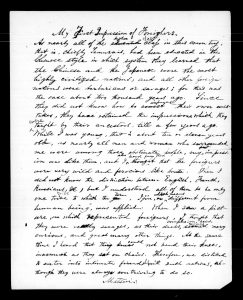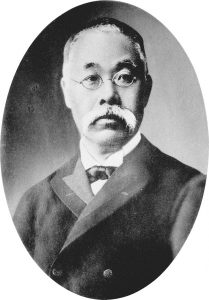Matsui
 My First Impression of Foreigners.
My First Impression of Foreigners.
(Transcribed by Stephen Hu, Camille Romano, Jin D. Sebastian, and Aishwarya Sridhar)
As nearly all of the higher class in this country, that is, chiefly Samurais, had been educated in the Chinese style in which system they learned that the Chinese and the Japanese were the most highly civilized nations, and all other foreign nations were barbarians or savages; for this was the case about two thousand years ago. Since they did not know how to improve their own mistakes, they have retained the impressions which they were taught by their ancestors, till a few years ago. While I was young, that is about ten or eleven years old, as nearly all men and women who surrounded me were among three obstinate people, any first impression was like them, and I also heard from them that the foreigners were very wild and ferocious like brute. Then I did not know the distinction between English, French, Russians, etc, but I understand all of them to be only one tribe to which the term, Ijin, which means “different from human being,” was applied. When I saw a picture, which represented foreigners, I thought that they were really savages, as their dress, complexion, hairs, seemed very curious, and great many other things. At the same time I heard that they could not bend their knees, inasmuch as they sat on chairs. Therefore, we disliked to enter into intimate friendship with such nations, although they were always contriving to do so.
Matsui
-
 Matsui Naokichi 松井直吉 (1857-1911)
Matsui Naokichi 松井直吉 (1857-1911)Born in present-day Gifu prefecture (Mino province, Ogaki domain). He entered Daigaku Nanko in 1871. He studies Mining at Columbia University from 1875-1880. Upon return, he teaches at the University of Tokyo as a professor of physics. In 1905, he becomes the president of the Imperial University of Tokyo and its College of Agriculture.
-
When reading this essay, Matsui depicts Japan’s cultural upbringing and how Japan has followed China’s footsteps ever since the very beginning of establishment of the nation. He acknowledges that the Japanese, due to China’s influence, all believed that they were the most civilized and developed nation but is no longer true due to their inability to “improve their own mistakes.”
Although Japan decided to coin new western characteristics, specifically in regard to education and military, the people still had seen westerners as barbaric or non-human. Matsui in his essay, emphasizes that he did not know the difference between westerners from different countries, and even when he was younger, he was surrounded by obstinate people who viewed foreigners in a poor manner.
Observing artwork of foreigners made by Japanese people myself matched the depiction made by Matsui as well. When viewing artwork that was made just around the time westerners arrived in Japan, they made them look ugly, big-nosed, and hairy. It truly represented what we would consider a barbarian. This image of foreigners kept the Japanese thinking that they were the superior society, although they ended up learning a lot from the west during the Meiji Restoration.
Later on, after westerners established themselves in Yokohama, people started adapting to western appearance and practices. For example, Japanese would start wearing western clothing, and some practiced Christianity. Likewise, people begun their journeys to the United States and Europe for education. This was the point where people wanted to learn more about how the west became so advanced in comparison to them, especially the United States, which was a fairly newer nation in comparison to Japan.
Although the Japanese in the beginning, like Matsui, had this negative first impression, Japan ended up modernizing with the help of westerners. I think that because of their cultural background and influence from China, Japan was being held back from flourishing, which was also acknowledged by Matsui when stating, “they have retained the impressions that they were taught by their ancestors, till a few years ago.” From disliking having an “intimate friendship,” to working together for years to come to bring Japan into a more advanced paradigm, the change is immense and intriguing due to Japanese having to look past their ideals and open up to new ideas.
-
Much like Nagai, Matsui is most likely on the younger side as he is welcoming to Western cultures and is open to their opinions. Matsui was likely brought up in a samurai family, as he makes explicit references to the upper class and their education systems. Also, many samurai were distrustful of the West at the time, which fits in with the negative description his elders had that he describes. They were even castigated as a uniform group of people, without any regard to their nationalities. The most prominent piece of information that we can get from this short passage is the usage of past tense; Matsui clearly has moved past from these views, or at the very least will not explicitly say them to a foreigner’s face in a foreigner’s homework assignment. He clearly thinks less of the higher class, criticizing their inability to “know how to improve their own mistakes” from the misleading information that they were taught in their Chinese style of education, and uses phrases like “[a]t the same time I heard” to cast doubt upon false rumors that foreigners could not even bend their own knees. Mitsui is different than these upper class he describes and most likely no longer identifies as one of them; he describes them in an extremely detached way and concludes his passage in such a way as to imply that he only mentions the facts to serve as a justification for why he, a member of the upper class, thought that way.
-
Much like Nagai, Mitsui is most likely on the younger side as he is welcoming to Western cultures and is open to their opinions. Mitsui was likely brought up in a samurai family, as he makes explicit references to the upper class and their education systems. Also, many samurai were distrustful of the West at the time, which fits in with the negative description his elders had that he describes. They were even castigated as a uniform group of people, without any regard to their nationalities. The most prominent piece of information that we can get from this short passage is the usage of past tense; Mitsui clearly has moved past from these views, or at the very least will not explicitly say them to a foreigner’s face in a foreigner’s homework assignment. He clearly thinks less of the higher class, criticizing their inability to “know how to improve their own mistakes” from the misleading information that they were taught in their Chinese style of education, and uses phrases like “[a]t the same time I heard” to cast doubt upon false rumors that foreigners could not even bend their own knees. Mitsui is different than these upper class he describes and most likely no longer identifies as one of them; he describes them in an extremely detached way and concludes his passage in such a way as to imply that he only mentions the facts to serve as a justification for why he, a member of the upper class, thought that way.